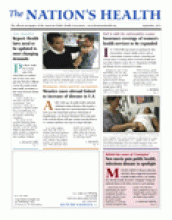Fewer than 4 percent of U.S. hospitals fully support new mothers in their efforts to breastfeed, despite the health benefits it offers to both mother and child, a new report finds.
According to the report, released in August by the Centers for Disease Control and Prevention, more than 96 percent of hospitals fall short of the full list of 10 steps needed to comply with the Baby-Friendly Hospital Initiative, a set of guidelines created by UNICEF and the World Health Organization. One in 10 hospitals met fewer than two of the steps, which include instructions for staff training, care of newborns, education of mothers and follow-up care.
The Vital Signs report, which analyzed data from CDC’s National Survey of Maternity Practices in Infant Nutrition and Care, found that 86 percent of hospitals have no official breastfeeding policy, while nearly 80 percent put infants on medically unnecessary formula diets. In addition, only one third of hospitals allow for “rooming in,” the practice of keeping mother and infant together 24 hours a day to help both become accustomed to breastfeeding.
While the report highlighted a lower obesity rate as one positive result of breastfeeding, the practice is linked to a variety of other positive health outcomes for both mother and child, according to the American Academy of Pediatrics. Infants who breastfeed have lower rates of bacterial infection, chronic digestive disease and sudden infant death syndrome, while their mothers are at reduced risk for breast and ovarian cancers. CDC estimates that low rates of breastfeeding cost the nation’s health care system $2.2 billion each year.
According to APHA member Joan Dodgson, PhD, MPH, RN, associate professor of nursing at Arizona State University, promoting breastfeeding is not a high enough priority for some health care providers.
“We don’t have enough physicians or nurses trained in lactation. There needs to be a critical mass of people willing to put forth the effort to change the status quo,” she told The Nation’s Health.
The report, which was published during World Breastfeeding Week, included a list of recommended actions for government agencies, health care providers, hospital administrators and mothers.
Among other things, it called for implementing statewide standards for maternal care, abolishing free formula sample giveaways to new mothers, the including lactation consultants in patient care teams and the establishing community-based breastfeeding support systems for mothers who have left the hospital. The report encouraged mothers to be proactive in discussing breastfeeding with their health care providers and to lobby their local hospitals to adopt the initiative guidelines.
Community networks and other means of post-hospital care are particularly important for promoting breastfeeding, said APHA member Michael Fraser, PhD, CEO of the Association of Maternal and Child Health Programs.
“It would be great if follow-up consultation was a standard service that every mom was able to access,” he told The Nation’s Health. “That’s where they develop the confidence, the sustained commitment.”
“It’s tough to expect hospitals to do it all and have those two or three days carry through to effective behavior change,” he said.
The report, “Hospital Support for Breastfeeding,” is available online at www.cdc.gov/vitalsigns.
- Copyright The Nation’s Health, American Public Health Association









